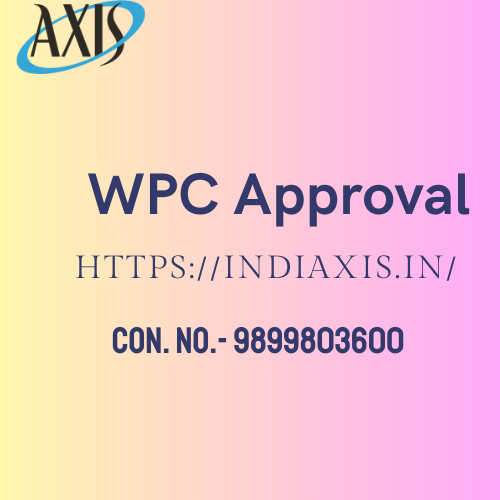
Wireless Planning and Coordination (WPC) Approval is a crucial regulatory requirement in India for the import, sale, and use of wireless and radio frequency-based products. Any organization or individual planning to introduce wireless communication devices into the Indian market must obtain WPC Approval from the Department of Telecommunications (DoT), under the Ministry of Communications, Government of India. This certification ensures that all wireless products comply with the national frequency spectrum regulations and do not interfere with the licensed radio frequencies.
What is WPC Approval?
WPC Approval is mandatory for any equipment operating in the wireless communication domain, including Bluetooth devices, Wi-Fi routers, RFID systems, drones, and other RF (Radio Frequency) enabled devices. The WPC Certification process ensures that these products meet the prescribed technical and legal requirements, preventing unauthorized use of frequency bands and potential interference with other communication networks.
Importance of WPC Approval
The significance of WPC Approval cannot be understated, especially for manufacturers, importers, and sellers of wireless communication products. Here are a few reasons why obtaining WPC Certification is vital:
-
Legal Compliance: Selling or using unapproved wireless devices in India can lead to legal consequences, including fines and product seizures.
-
Market Access: Only products with WPC Certification can be legally sold in India, making it a crucial step for market entry.
-
Prevention of Frequency Interference: Unauthorized devices can cause interference with licensed communication networks, leading to disruptions. WPC Approval ensures that all devices operate within the allocated frequency bands.
-
Consumer Trust: Certification boosts consumer confidence by ensuring that products meet the necessary safety and quality standards.
-
Import Clearance: Importers of wireless devices need WPC Approval to clear their products through customs without any hurdles.
Types of WPC Certifications
1. Equipment Type Approval (ETA)
ETA Certification is required for wireless products that operate within de-licensed frequency bands. These bands are open for public use but require regulatory approval to ensure compliance with technical standards. Devices such as Wi-Fi modules, Bluetooth accessories, and RFID products often require ETA Approval before being marketed.
2. Import License
For wireless equipment operating within licensed frequency bands, an Import License is mandatory. This certification applies to organizations importing such devices for commercial or private use. The process involves submitting technical details and obtaining permission from WPC.
3. Dealer Possession License (DPL) & Non-Dealer Possession License (NDPL)
-
DPL is required for businesses dealing in wireless equipment.
-
NDPL is issued to entities that use wireless devices but do not engage in commercial sales.
WPC Approval Process
The process for obtaining WPC Approval involves several steps, which must be carefully followed to ensure compliance. Below is a step-by-step guide to obtaining WPC Certification:
-
Product Testing: The first step is to test the product in an accredited lab to ensure compliance with wireless communication standards. The product must adhere to the guidelines set by WPC and the Department of Telecommunications.
-
Submission of Application: Once testing is complete, an application must be submitted online via the Saral Sanchar portal, the official platform for obtaining WPC certifications.
-
Technical Documentation: Applicants must provide detailed technical documentation, including RF test reports, product specifications, and compliance certificates.
-
Application Review: WPC authorities review the application and documentation to verify compliance.
-
Approval and Certification: If all requirements are met, WPC grants approval, and the applicant receives the necessary certification, allowing them to import, sell, or use the wireless device in India.
Documents Required for WPC Approval
To obtain WPC Approval, applicants must submit the following documents:
-
RF Test Report from an accredited laboratory
-
Product specifications and technical details
-
Import-export code (for importers)
-
Business registration documents
-
Letter of authorization (if applying through an authorized representative)
-
User manual and datasheets of the wireless product
-
Copy of BIS (Bureau of Indian Standards) certificate (if applicable)
Challenges in Obtaining WPC Approval
While the WPC Certification process is essential, applicants often face challenges such as:
-
Technical Compliance Issues: Ensuring that a product meets all RF standards can be complex and may require modifications.
-
Lengthy Approval Process: The certification process may take weeks or even months, causing delays in product launches.
-
Regulatory Updates: Frequent updates in regulatory requirements necessitate staying informed to avoid non-compliance.
-
Document Submission Errors: Incomplete or incorrect documentation can lead to rejection or delays.
Tips for a Smooth WPC Approval Process
To avoid delays and ensure a successful WPC Approval, consider the following tips:
-
Work with an Expert: Hiring consultants familiar with the WPC certification process can simplify and expedite approvals.
-
Ensure Accurate Documentation: Double-check all documents before submission to avoid rejection.
-
Stay Updated on Regulations: WPC guidelines may change, so staying informed is crucial.
-
Plan for Sufficient Time: Start the certification process well in advance to avoid disruptions in your product launch or import schedule.
-
Use Accredited Testing Labs: Only test reports from recognized labs will be accepted, so ensure compliance before submission.
Conclusion
WPC Approval is a critical requirement for companies dealing with wireless communication products in India. Ensuring compliance with WPC regulations not only facilitates smooth market entry but also enhances product credibility and consumer trust. By understanding the WPC Certification process, required documentation, and potential challenges, businesses can navigate the regulatory landscape effectively.





Leave a Reply